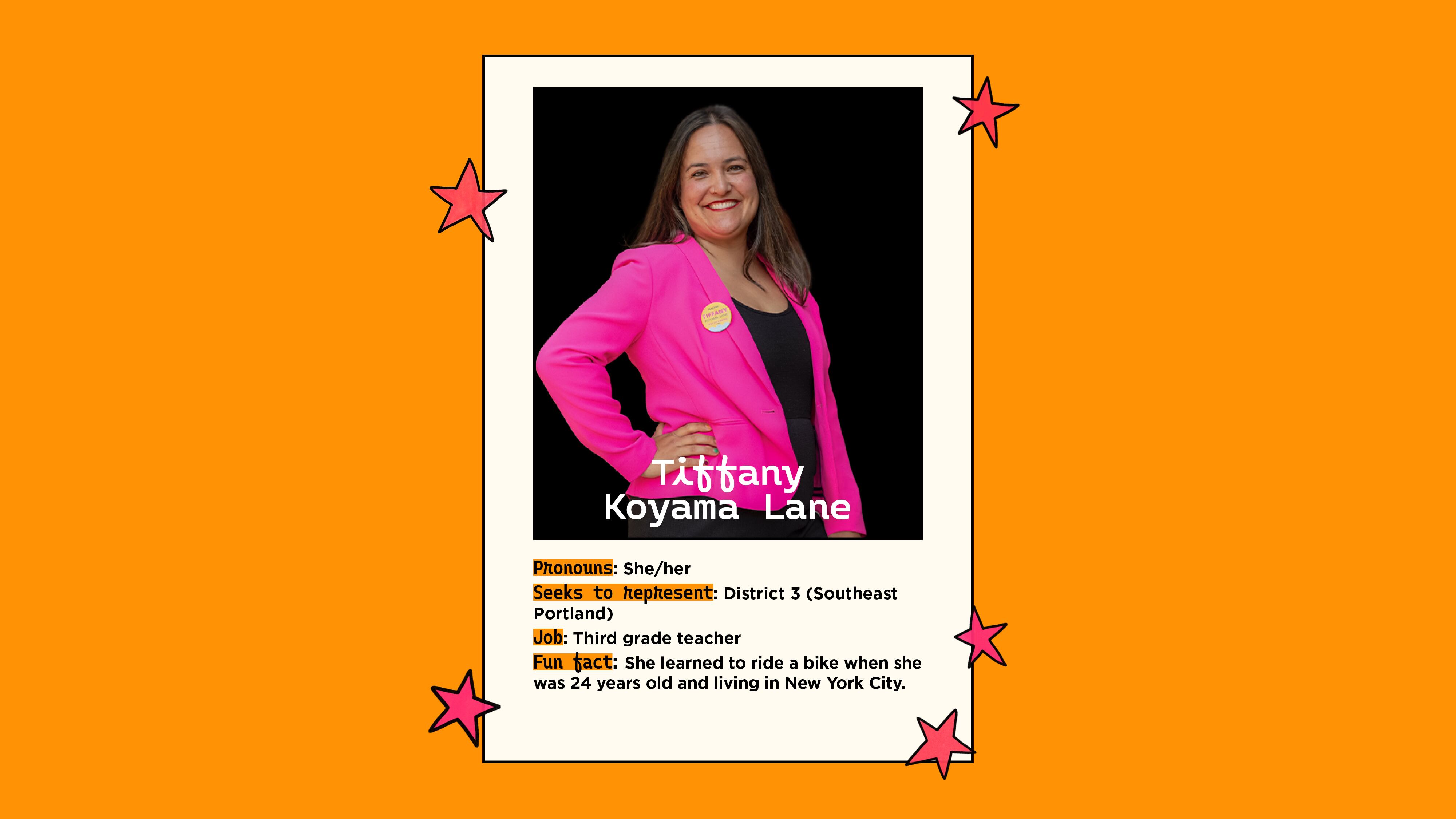Pronouns: She/her
Seeks to represent: District 3 (Southeast Portland)
Job: Third grade teacher
Fun fact: She learned to ride a bike when she was 24 years old and living in New York City.
Tiffany Koyama Lane says the failures and challenges Portland faces as a city routinely show up in her third grade classroom at Sunnyside Environmental School.
“I’ve had kids bring their dirty laundry to school because they don’t have access to a washer and dryer. I’ve had parents bring their utility bills into school because they don’t speak English and can’t figure out how to pay their bills,” she says. “These are things that we should be dealing with in City Hall.”
Koyama Lane, 38, is going into her 16th year of teaching. She moved to Portland 12 years ago, having taught for three years in New York after getting her master’s in elementary education at the University of Oregon. Since then, she’s served as an organizer for the Portland Association of Teachers (that’s the union that represents Portland Public Schools teachers) and helped found the Education Advisory Board of the Japanese American Museum of Oregon and a parent-led group called Raising Antiracist Kids PDX, which shares resources about how to teach about racial justice.
She hopes to represent Portland City Council District 3 so she can tackle the problems that plague her students and their families. “They deserve dignity,” she tells WW. “They deserve solutions that work for everyone.”
Koyama Lane has received $80,000 in matching campaign funds from the Small Donors Election program. In total, her campaign has raised almost $122,000. She’s been endorsed by mayoral candidate Carmen Rubio, state Reps. Hoa Nguyen (D-East Portland) and Farrah Chaichi (D-Aloha), the PAT, and the Northwest Oregon Labor Council.
We spoke to Koyama Lane about her campaign. Questions and answers have been lightly edited for brevity and clarity.
WW: What are your top three priorities if elected?
Tiffany Koyama Lane: My vision is a safe, housed and connected Portland where leaders prioritize common sense solutions, such as Portland Street Response, strong rental protections, and new models to improve housing supply and affordability for working families. I want a Portland where streets are designed with safety in mind and public transportation is plentiful. I want people to connect in public spaces that are vibrant and joyful.
Beyond policing, what measures would you take to improve public safety in Portland neighborhoods?
I support funding and expanding nonpolice programs like Portland Street Response and the Streetcar Ambassador Program, which provides a nonsecurity presence to give out items such as bottled water and connect riders to social services. I think about it in terms of having the right to move through your neighborhood without the fear of traffic violence. Streets are safer for families to bike, roll, walk when there are more streetlights. I see investing in our literal streets as an investment in our community.
How would you support local businesses and foster economic growth in Portland?
I think it’s really important that small business owners are part of the discussion. A lot of our land use and transportation policy connects to the health of local economies. Bike lanes and interventions for pedestrian safety on Sandy Boulevard, for example, would bring more foot traffic to the amazing businesses along that street, and along other unsafe, high-crash corridors. Those are top of mind for me.
What aspects of the city’s current approach to drug use and overdose deaths do you support and what would you change?
I understand many people’s frustrations with Measure 110 and the fact that it was not rolled out completely in the short amount of time that it was given. I want to highlight that recriminalizing drugs doesn’t make fentanyl any less addictive. It doesn’t make treatment easier to get. It doesn’t help us get more available public defenders.
I am glad that House Bills 4002 and 5204 included an additional $200 million for treatment and recovery. That said, I don’t think criminalization is an effective solution for addiction, and I especially don’t think it makes sense in a state with a crisis-level deficit of public defenders and a shortage of jail beds.
There needs to be more communication about how to access recovery, and I’d like to see us move away from for-profit opioid treatment. When there is a profit motive involved in substance use treatment, I worry a bit about that.
Do you support the city staying in the Joint Office of Homeless Services? What’s your plan to address homelessness?
I do support the city staying in the Joint Office. When there’s two separate governments dealing with the same problem, it doesn’t make sense to move things farther apart.
We have to address the burnout of service providers, and we need more housing navigators. I’m interested in trying models of city-owned housing. I talked to city councilors in Denver and Seattle that are talking about social housing, where it’s open to anyone at a percentage of income.
Which current City Council members do you and your policies most align with?
Carmen Rubio is someone who I got an early endorsement from. I look up to her and I would love to work with her.
How do you want police to respond to the riots in November if Trump wins?
I’m not assuming that there will be riots. I support people in coming out into the streets to voice grief and rage. There are ways to deescalate situations that are on the track for becoming violent.
When I think about Portland in 2020 and the federal forces that were sent in—that’s not the way to deescalate. If you treat every movement of people in streets like it’s going to be a riot that needs to be suppressed, then I think that’s what it becomes. I think we do more outreach to these small businesses, especially central small businesses, and think about routes if protests were to happen.
What motivated you to run for City Council?
I believe City Hall should be a place of service for my students, for their families, for workers, for all Portlanders, and that is why I’m running. I’m Yonsei, a fourth-generation Japanese American. My family was forced into the World War II internment camps. They were sent to Topaz, Utah, and Gila River, Arizona. They were farmers and had their farmland, their livelihood and their dignity stolen. I believe that their history lives within me, and it fuels me and the work I do. It fuels what I care about. It helps me know on a very deep level that dignity is a basic human right, and through our public policies, through those decisions, we show who is deserving of dignity.
Correction: A previous version of this story incorrectly stated that Tiffany Koyama Lane qualified $40,000 in matched donations through the Small Donors Elections program. She has actually qualified for $80,000 in matched donations. WW regrets the error.
See the other Portland City Council Candidates here!
 This article is part of Willamette Week’s Ballot Buddy, our special 2024 election coverage. Read more Ballot Buddy here.
This article is part of Willamette Week’s Ballot Buddy, our special 2024 election coverage. Read more Ballot Buddy here.

